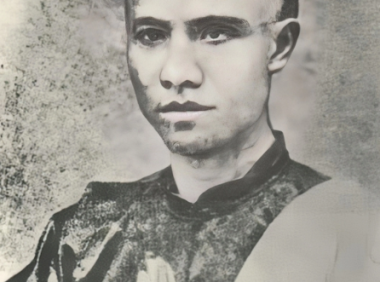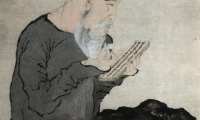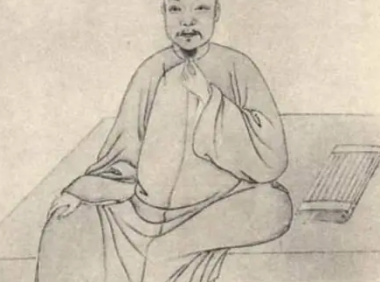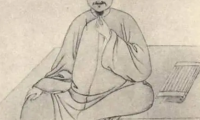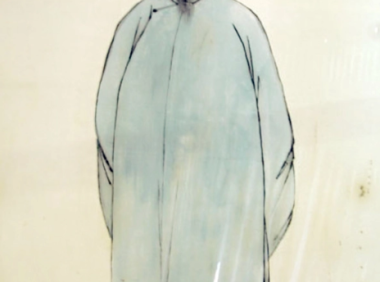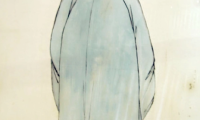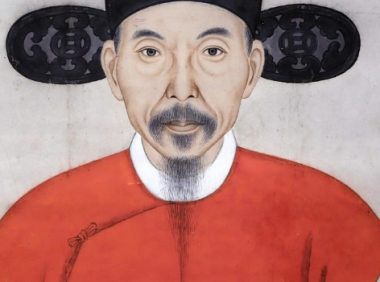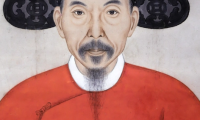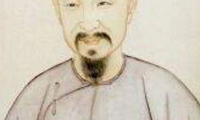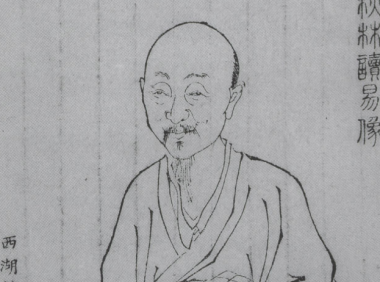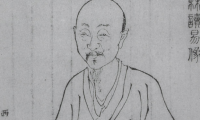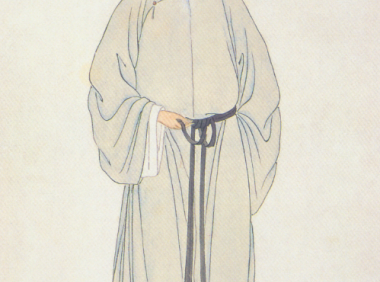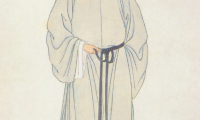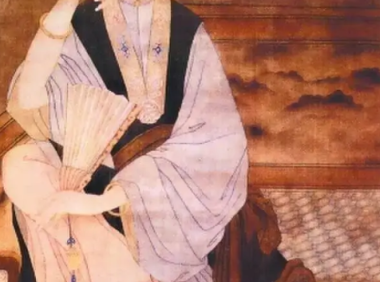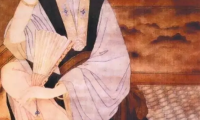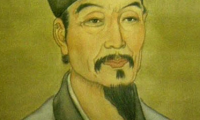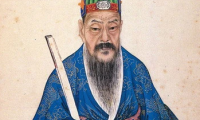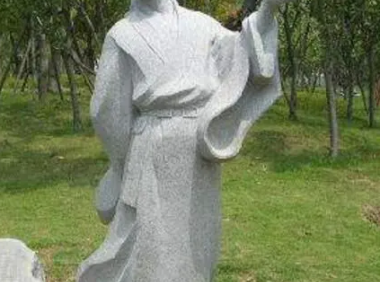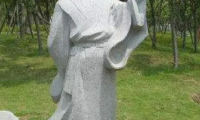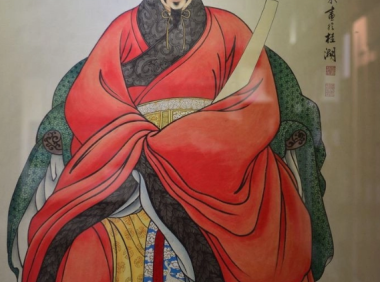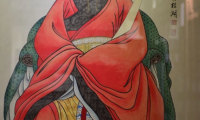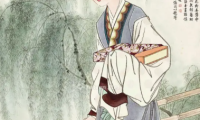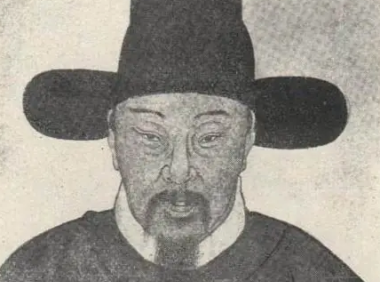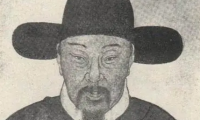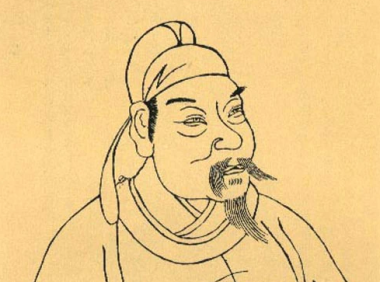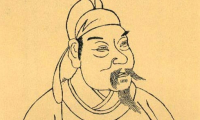-
Tan Sitong Poem: At Dawn Atop the Highest Peak of the Southern Mountain – 谭嗣同《晨登衡岳祝融峰》
晨登衡岳祝融峰 [清]谭嗣同 身高殊不觉, 四顾乃无峰。 但有浮云度, 时时一荡胸。 地沉星尽没, 天跃日初熔[1]。 半勺洞庭水, 秋寒欲起龙。 注释: [1]天跃日初熔:这句是说天际出现了火红的朝霞,太阳像刚冶炼过的火球,霎时光焰万丈,染红了天边。 At Dawn Atop the Highest Peak of the Southern Mountain Tan Sitong[1] Atop the peak I feel not high; Looking around, I find no crest. I only see clouds floating by Now and then purify my breast. Beyond dark earth stars sink awake; The sun leaps up like molten gold. From half the spoon of Dongting Lake Dragon would rise in autumn cold. 注释: [1]The poet was a reformist put to death at the age of 33. A native of Hunan, he ascended in 1891 the highest peak of the Southern Mountain in his homeland. "Climbing Zhurong Peak of Hengshan Mountain in the Morning" is a five-character regulated verse written by Tan Sitong, a thinker in the Qing Dynasty. The poem describes the scene the author saw when he climbed Zhurong Peak of Hengshan Mountain. The first four sentences highlight the height of Zhurong Peak; the fifth and sixth sentences describe the scene of the night disappearing and the dawn appearing when climbing Zhurong Peak; the last two sentences describe the view of Dongting Lake from the top of the mountain, which is so small that it looks…...
- 0
- 0
- 12
-
Jin Nong Poem: The Willow – 金农《柳》
柳 [清]金农 销魂桥[1]外绿匆匆, 树亦销魂客送空。 万缕千丝生便好, 剪刀谁说胜春风。 注释: [1]销魂桥:唐时指灞桥,在陕西西安市长安区东。因远行者与送别者常于此惜别,故称。 The Willow Jin Nong Beyond Heart-broken Bridge the willows green in haste; When friends are gone away, heart-broken are the trees. Thousands of branches wave like dancer's slender waist; Could scissors cut more slender leaves than vernal breeze?...
- 0
- 0
- 31
-
Li E Poem: In Lakeside Pavilion– 厉鹗《湖楼题壁》
湖楼题壁 [清]厉鹗 水落山寒处, 盈盈[1]记踏春。 朱栏[2]今已朽[3], 何况倚栏人! 注释: [1]盈盈:形容动作轻盈。 [2]朱栏:红色的栏杆。 [3]朽:腐蚀,朽烂。 In Lakeside Pavilion[1] Li E The hills look cold when water falls, ’Tis vernal joy my heart recalls. The balustrade's no longer red, My love who leaned on it is dead. 注释: [1]This quatrain was written in memory of the poet's fair mistress who died at the age of 24 and was buried by the lakeside. "Wall of Lake Tower" is a five-character quatrain written by Li E in the Qing Dynasty. The first two lines of the poem evoke beautiful memories of the past by describing the current desolate scenery. The last two lines describe the decayed lake tower in front of the poet, expressing his deep feelings about the rise and fall of the world and the aging of life. The poem uses allusions without leaving any trace, which makes the poem contain philosophy and shows true feelings....
- 0
- 0
- 9
-
Zheng Xie Poem: Written on a Picture of Bamboo – 郑燮《潍县署中画竹呈年伯包大中丞括》
潍县[1]署中画竹潍县署中画竹呈年伯包大中丞括 [清]郑燮 衙斋[2]卧听萧萧[3]竹, 疑是民间疾苦声。 些小[4]吾曹[5]州县吏, 一枝一叶总关情[6]。 注释: [1]潍县:今山东潍坊市。 [2]衙斋:官署书房。 [3]萧萧:竹枝摇动的声音。 [4]些小:小小,指官职卑微。 [5]吾曹:我辈。 [6]关情:牵动感情。 Written on a Picture of Bamboo[1] Zheng Xie I listen in my office to rustling bamboo; It seems to complain of its woe as people do. Petty official, I should try to play my part; To ease shivering leaf as sorrow-laden heart. 注释: [1]This quatrain was written on a picture drawn by the poet for Governor Bao. "Painting Bamboo in Weixian County Office Presented to My Uncle Bao Dazhong Cheng Kuo" is a seven-character quatrain written by the Qing Dynasty poet Zheng Xie. The poem first describes the sounds heard in the county office one night, then associates it with the suffering of the people, and finally expresses the poet's ambition to take the people's livelihood as his own. The poem uses metaphors to reveal the poet's deep concern for the fate of the people....
- 0
- 0
- 21
-
Qu Dajun Poem: Before the Flowers – 屈大均《花前》
A five-character regulated verse written by the poet Qu Dajun in the late Ming and early Qing dynasties...
- 0
- 0
- 14
-
Kong Shangren Poem: The Grand River Viewed from the Northern Mountain – 孔尚任《北固山看大江》
北固山[1]看大江 [清]孔尚任 孤城铁瓮[2]四山围, 绝顶高秋坐落晖[3]。 眼见长江趋大海, 青天却似向西飞。 注释: [1]北固山:山名,在今天江苏省镇江市以北,三面临江。 [2]铁瓮:镇江城的别名。 [3]坐落晖:坐在夕阳中。落晖,夕阳。 The Grand River Viewed from the Northern Mountain Kong Shangren[1] The lonely iron-clad town's girt by mountains high; Viewing autumn sunset, I sit on mountain crest. So fast the endless River's eastwards running by; It seems the azure sky were flying to the west. 注释: [1]Kong Shangren was a playwright, author of Peach Blooms Painted with Blood. "Watching the Yangtze River from Beigu Mountain" is a seven-character quatrain written by Kong Shangren, a poet in the Qing Dynasty. The first two lines of the poem describe "Beigu Mountain", which gives a sense of tranquility, and the writing is very precise and mature; the last two lines describe the Yangtze River, which is a flying momentum, which is the warning point in the poem. The whole poem combines movement and stillness, and uses stillness to set off movement; the conception is unique, and it writes out the magnificent scenery that is in the heart but not in the pen....
- 0
- 0
- 8
-
Shi Runzhang Poem: Snow Scene Viewed from the Pavilion – 施润章《雪中阁望》
"View from the Pavilion in the Snow" is a poem written by Shi Runzhang in the Qing Dynasty....
- 0
- 0
- 12
-
Qian Qianyi Poem: View from the Garden of Ding – 钱谦益《留题秦淮丁家水阁》
留题秦淮丁家水阁 [清]钱谦益 苑外杨花[1]待暮潮, 隔溪桃叶[2]限红桥。 夕阳凝望春如水, 丁字帘[3]前是六朝。 注释: [1]苑外杨花:表面上写丁家花园外的杨柳,暗指钱谦益的爱妾柳如是。 [2]桃叶:桃叶渡,在南京市秦淮河与青溪合流的地方。 [3]丁字帘:地名,在南京市利涉桥畔。明末为妓女聚居的地方。 View from the Garden of Ding Qian Qianyi[1] The willow down afield waits for the evening tide; A painted bridge leads to Peach Leaf by riverside. At sunset water-limpid spring attracts my gaze. O where's the splendor of the Six Dynasties days! 注释: [1]Qian Qianyi was one of the first Ming scholar-officials who declared his allegiance to the Qing conquerors, and was then accused of plotting against the Qing emperor. "Leaving a Poem at the Ding Family Pavilion in Qinhuai" is a seven-character quatrain written by the Qing Dynasty poet Qian Qianyi. The poem mainly describes the scenery and waterscape of the historic city of Jinling viewed from the Ding Family Pavilion. As a thousand-year-old capital, Jinling is full of spring scenery; but although the spring scenery remains the same, the Qinhuai River, which was once bustling with singing and dancing, is now desolate in front of the Dingzi curtain. The description of the spring scenery and dusk expresses the poet's regret for the late Ming Dynasty....
- 0
- 0
- 13
-
Qian Qianyi Poem: The Orchid Flower – 钱谦益《咏同心兰》
"Four Quatrains in Ode to the Orchid of the Same Heart" is a seven-character quatrain by Qian Qianyi, a poet of the Qing Dynasty....
- 0
- 0
- 31
-
Liu Rushi Poem: West Lake – 柳如是《西湖》
西湖 [清]柳如是 垂杨小院绣帘东, 莺阁残枝蝶趁风。 大抵西泠[1]寒食路, 桃花得气美人中。 注释: [1]西泠:亦称“西陵桥”或“西林桥”。在杭州孤山西北尽头处,是由孤山入北山的必经之路。 West Lake Liu Rushi[1] The weeping willows stand east of the curtained bowers; Orioles and butterflies pass through the faded flowers. But peach blossoms on Cold Food Day are beautified By beauties living or buried by the lakeside[2]. 注释: [1]The poetess was first in love with Chen Zilong who resisted the Qing conquerors and drowned himself when defeated. At last, she was wedded to Qian Qianyi. [2]General Yue Fei was the hero and Su Xiaoxiao and Feng Xiaoqing were beauties buried by the side of West Lake. Liu Rushi, a female poet in the late Ming and early Qing dynasties, was born Yang Ai, with the courtesy name Rushi, also known as Hedong Jun. She named herself Rushi because she read the poem "He Xinlang" by Xin Qiji of the Song Dynasty: "I see the green mountains are so charming, I guess the green mountains see me like this", and was born in Jiaxing, Zhejiang. Liu Rushi is one of the "Eight Beauties of Qinhuai". She was smart and studious since childhood, but because of her poor family, she was abducted and sold since she was a child, and traveled between Jiangsu,…...
- 0
- 0
- 67
-
Wu Chengen Poem: The Autumn Moon – 吴承恩《对月感秋》
Wu Chengen Wu Chengen(1500-1582) Ming novelist. Born in Shanyang, with the courtesy name Ruzhong and the pseudonym Sheyang Shanren. He suffered repeated setbacks in the imperial examinations. He was appointed as a tribute student in the Jiajing period and later served as the magistrate of Changxing County in Zhejiang. He was ashamed to bow down for a few grains of rice, so he left the country and devoted himself to writing. He liked to read wild stories and strange novels since he was a child. He was good at making jokes. In his later years, he wrote "Journey to the West", which tells the story of the Tang monk Xuanzang's journey to the West. He also has "Sheyang Xiansheng's Manuscripts" and "Yu Ding Zhi". 对月感秋 [明]吴承恩 人云天上月, 中有嫦娥居。 孤栖[1]与谁共? 顾兔并蟾蜍。 冰轮[2]不载土, 桂树无根株[3]。 纷纷黄金粟[4], 岁岁何由舒[5]? 一闭千万年, 玉颜[6]近何如? 相违不咫尺[7], 照我阑干偶。 一杯劝尔酒, 为我留须臾[8]。 注释: [1]孤栖:孤孤单单地栖居。 [2]冰轮:圆月。 [3]无根株:此句指的是那高耸月宫的桂树不生枝干。 [4]黄金粟:代指桂花。 [5]舒:舒发,生长。 [6]玉颜:美丽的容颜。 [7]咫尺:比喻距离很近。 [8]须臾:片刻,一会儿。 The Autumn Moon[1] Wu Chengen[2] ’Tis said a fair lady on high Resides in the moon up the sky. With whom her solitude to share? An ugly toad and a jade hare. On icy moon there is no clay; The rootless laurel tree can't stay. How can its golden grains appear…...
- 0
- 0
- 26
-
Yang Jisheng Poem: On Mount Tai – 杨继盛《登泰山》
登泰山 [明]杨继盛 志欲小天下, 特来登泰山。 仰观绝顶上, 犹有白云还。 On Mount Tai Yang Jisheng[1] The world's small east to west When I climb mountains high. I look up from the crest: Higher white clouds sail by. 注释: [1]Yang Jisheng was minister of war sentenced to death for he impeached the prime minister of treason. Climbing Mount Tai is a poem by Yang Jisheng of the Ming Dynasty. The meaning of this poem is: Because of the ambition of "wanting to look down on the world", I specially climbed Mount Tai. The meaning of this poem is: Because of the ambition of "wanting to look down on the world", I specially climbed Mount Tai. After climbing to the top of Mount Tai and looking up, I saw that there were still leisurely white clouds on the top of Mount Tai, traveling between the vastness of space....
- 0
- 0
- 13
-
He Jingming Poem: Song of the Autumn River – 何景明《秋江词》
"Autumn River Lyrics" is an ancient folk song written by He Jingming, a poet of the Ming Dynasty....
- 0
- 0
- 15
-
Yang Shen Poem: The Willow – 杨慎《柳》
柳 [明]杨慎 垂杨垂柳管[1]芳年[2], 飞絮飞花媚远天[3]。 金距斗鸡[4]寒食后, 玉蛾[5]翻雪暖风前。 别离江上还河上, 抛掷[6]桥边与路边。 游子魂销青塞[7]月, 美人肠断翠楼烟。 注释: [1]管:负责,这里指杨柳最先抽芽,迎来春天。 [2]芳年:美好的春天。 [3]媚远天:将春天点缀得更加妩媚。 [4]金距斗鸡:这里指柳树刚冒出的嫩黄色新芽,就像人们在斗鸡时套在鸡脚上的距刺。 [5]玉蛾:这里比喻一团一团的柳絮。 [6]抛掷:丢弃、弃置。 [7]青塞:边塞、边地。 The Willow Yang Shen[1] The weeping willow tree o'er fragrant spring holds sway; Its yellow sprout looks like gold claw on Cold Food Day.[2] Flower-like willow down enchants the boundless sky; It flies like snow or moth of jade in warm wind high. It weeps on seeing people part on river wide; Its broken twigs are cast by the bridge or roadside. My heart breaks 'neath the moon on willowless frontier; Severed by willow screen, my love sheds tear on tear. 注释: [1]The poet won the first honor in imperial exam of 1511, and was banished to Yunnan for over thirty years. [2]On Cold Food Day Chinese people used to take cold meals and visit their ancestral graveyard. "Willow" is a seven-character regulated verse written by Yang Shen, a poet in the Ming Dynasty. The first couplet of this poem describes how the willow turns green early in the spring, ahead of the wind; the second couplet uses seasonal scenery related to the willow to continue to exaggerate the posture and appearance of the willow in spring; the third couplet takes a…...
- 0
- 0
- 27
-
Huang E Poem: To My Husband – 黄峨《又寄升庵》
"Another Letter to Sheng'an" is a poem written by Huang E in the Ming Dynasty....
- 0
- 0
- 23
-
Gao Qi Poem: Husking Rice – 高启《田舍夜舂》
田舍夜舂 [明]高启 新妇舂粮[1]独睡迟, 夜寒茅屋雨来时。 灯前每嘱儿休哭, 明日行人要早炊。 注释: [1]舂粮:捣米备粮。 Husking Rice Gao Qi The wife is husking rice till late into the night, Alone in thatched cottage cold with wind and rain. She tells her baby not to cry by candlelight, For early risers need their meal to start again. "Night Pounding in the Farmhouse" is a seven-character quatrain written by Gao Qi, a poet in the late Yuan Dynasty and early Ming Dynasty. The first line of the poem describes a young woman working late at night to make spring crops; the second line describes the living environment; the third line describes how the young woman needs to make spring crops while taking care of her child, and how she is worried that her son will get sick from crying and that he will disturb her husband's sleep; the last line answers the first three lines. This poem uses plain language to bring to life the image of a hardworking, simple, and virtuous young woman in a farmhouse with just a few words....
- 0
- 0
- 10
-
李煜《虞美人·春花秋月何时了》- The Lyrics of Li Yu – Chinese Poems – (Southern Tang)
Li Yu 虞美人 春花秋月何时了? 往事知多少! 小楼昨夜又东风, 故国不堪回首月明中。 雕栏玉砌应犹在, 只是朱颜改。 问君能有几多愁? 恰似一江春水向东流! 李后主被俘到汴京后,在生日时饮酒填词,宋太宗一怒之下,下令用牵机药把他毒死。因此,这首《虞美人》是用生命为代价写出来的。王国维说:“后主之词,真所谓以血书者也。”后主的经历概括了人生最深刻的生死之悲,最广阔的兴亡之感。这首词超越了个人的悲痛,具有普遍的意义,是唐宋词中的珍品。 上阕第一句凭空而来,出人意料:“春花秋月”引起他对花前月下的美好回忆,而现在却身为臣虏,在悲痛中回忆欢乐的往事,那就更觉得“故国不堪回首”的悲痛了! 下阕第一句是对“故国”南唐宫殿的特写:南唐的宫殿应该还在,但宫中的美人呢?小周后已经入宋宫随侍了。物是人非,今昔对比,怎不叫李后主悲痛欲绝!最后,只好无可奈何地问自己:你要知道我有多么悲哀吗?那只消看无穷无尽、不舍昼夜、滚滚东流的长江水。真是“天长地久有时尽,此恨绵绵无绝期”! The Beautiful Lady Yu When will there be no more autumn moon and spring flowers For me who had so many memorable hours? The east wind blew again in my garden last night. How can I bear the cruel memory of bowers And palaces steeped in moonlight? Carved balustrades and marble steps must still be there, But rosy faces cannot be as fair. If you ask me how much my sorrow has increased, Just see the overbrimming river flowing east!...
- 0
- 0
- 60
-
李煜《梦江南》- The Lyrics of Li Yu – Chinese Poems – (Southern Tang)
Li Yu 梦江南 一 多少恨, 昨夜梦魂中! 还似旧时游上苑, 车如流水马如龙, 花月正春风。 二 多少泪, 断脸复横颐[1]。 心事莫将和泪说, 凤笙休向泪时吹, 肠断更无疑。 王夫之《姜斋诗话》中说,以乐景写哀,以哀景写乐,倍增其哀。第一首《梦江南》就是“以乐景写哀”的典型。第一句“多少恨”可以是问句,也可以不是,但问句感情更强烈。第二句作为回答,就更令人梦断魂销。但第二句也可以和第一句合成一问,那就是说:昨夜梦见什么了?第三句是回答,也可以说“游上苑”是“梦”的具体化。而第四句又是“游上苑”的具体化。如果说第四句是借车马写人物,那第五句就是借景物写欢情:花好月圆,春风和煦。但那都是“旧时”的事了。如今却是“门前冷落车马稀”,“春花秋月”都已了。今昔对比,乐景反而“倍增其哀”,尽在不言中了。 第二首特写泪脸:“断脸复横颐。”眼泪纵横交流,颊下额上泪痕道道,仿佛把脸都划断了,可见眼泪之多。因此,即使有满腔的心事,也不要和着眼泪倾吐,以免泪流不止。吹笙本来是为了发泄痛苦,减轻悲哀,但在流泪时吹笙,眼泪只会越吹越多,一定会吹得心碎肠断的。 注释: [1]颐:脸颊。 Dreaming of the South I How much regret In last night’s dream! It seemed as if we were in royal garden yet: Dragonlike steeds and carriages run like flowing stream; In vernal wind the moon and flowers beam. II How many tears Crisscross my cheeks between my ears! Don’t ask about my grief of recent years Nor play on flute when tears come out, Or else my heart would break,no doubt!...
- 0
- 0
- 7
-
李煜《子夜歌》- The Lyrics of Li Yu – Chinese Poems – (Southern Tang)
Li Yu 子夜歌 人生愁恨何能免? 销魂独我情何限[1]! 故国梦重归, 觉来双泪垂! 高楼谁与[2]上? 长记[3]秋晴望。 往事已成空, 还如一梦中! 这首词又名《菩萨蛮》,是李后主到汴京后抒写亡国哀思的作品。 前段第一句是泛指,说人只要闲着总免不了忧愁,免不了有恨事。第二句具体到词人自己身上,说为什么唯独我的愁恨特别多,多到了无限的地步?为什么我的愁恨特别深,深到了魂销肠断的程度?第三句是间接的回答:因为词人是一个亡国的君主,夜里又梦见回到了失去的故国,或者又在御花园里寻欢作乐,又看见车水马龙,又沉醉在花月春风之中。所以醒来又不免“多少泪,断脸复横颐”! 前段写恨、写梦、写泪;后段头两句写忆、写事。回想自己当君主时,常同后妃登高望远,饮酒作乐;如今“一旦归为臣虏”,还有谁同自己去登“连霄汉”的“凤阁龙楼”呢?只有在记忆中回顾当年秋高气爽、晴空万里的江南景象了。最后说到“往事”不堪回首,“还如一梦”,又从夜里梦游故国回到现实之中,再从现实中发觉人生如梦,写出了词人无可奈何的心情。 注释: [1]何限:没有界限。 [2]谁与:和谁。 [3]长记:永远记着。 Midnight Song From sorrow and regret our life cannot be free. Why is this soul-consuming grief e’er haunting me? I went to my lost land in dreams; Awake,I find tears flow in streams. Who would ascend with me those towers high? I can’t forget fine autumn days gone by. Vain is the happiness of yore; It melts like dream and is no more....
- 0
- 0
- 27
-
李煜《浣溪沙》- The Lyrics of Li Yu – Chinese Poems – (Southern Tang)
Li Yu 浣溪沙 红日已高三丈透, 金炉次第添香兽, 红锦地衣随步皱。 佳人舞点金钗溜[1], 酒恶[2]时拈花蕊嗅, 别殿遥闻箫鼓奏。 这是李后主描写自己在位期间的寻欢作乐图。前段第一句“透”是说太阳已经高高地照耀在三丈多高的旗杆上,表示李后主通宵狂欢。第二句的“香兽”指做成兽形的香料或燃料,这句是说宫女们还在接二连三地把香料加到金质的香炉中去燃烧,使舞庭中香气氤氲。第三句是说红色丝织的地毯随着舞女的步子起皱。前段三句第一句写外景,兼写时间,第二、三句写内景,第三句兼写主角;“金炉香兽”“红锦地衣”写出了宫廷的豪华。 后段前两句是主角的特写。第一句中的“舞点”是舞乐中表示节奏的鼓点,一作“舞急”,是说舞女跳得太急,连头上的金钗也溜下来了。第二句中的“酒恶”,就是喝酒喝到带醉的时候,舞女时时拈起花来闻闻,可以解醉。最后一句说:从其他宫殿也传来了吹箫击鼓、欢乐达旦的声音。这说明歌舞升平不是个别现象。 注释: [1]溜:滑落。 [2]酒恶:《诗话总龟》中作“酒渥”。亦称“中酒”,指酒意微醉。这是当时方言。 Silk-washing Stream Above the thirty-foot-high flagpole shines the sun; Incense is added to gold burners one by one; Red carpets wrinkle as each dancing step is done. Fair dancers let gold hairpins drop with rhythm fleet; Drunk,maidens oft inhale the smell of flowers sweet; From hall to hall flute’s heard to play and drum to beat....
- 0
- 0
- 7
-
李煜《柳枝词》- The Lyrics of Li Yu – Chinese Poems – (Southern Tang)
Li Yu 柳枝词 风情渐老见春羞, 到处芳魂感旧游。 多谢长条似相识, 强垂烟穗拂人头。 这首《柳枝词》是写给宫女庆奴的。英译文可以解释如后:“在春风秋月中,她的年华逐渐增长,现在看到鲜艳的春花,她也不好意思再去争艳比美了,反会自惭形秽。每看到一朵落花,就会觉得是一个死去了的老朋友的芳魂。只有杨柳婀娜多姿的长条绿枝还会低下头来招呼她,用那如烟似云的柳梢来抚摩她那仿佛不减当年的脸颊。”比较一下原文和译文,可以看出译文比原文具体多了。原文第一句的“风情”意思比较模糊,一般是指风月之情,译文则具体说是春风秋月使她变老了。第二句的“芳魂”和“旧游”解释也不明确,译文却明确指出是曾经赏心悦目而现已死去的花魂,并且把花拟人,说成是死去的老朋友。第三句把柳枝也拟人化,说它婀娜多姿地向她点头,这就生动地点明了主题是柳枝。第四句再把柳枝拟人,把原文的“拂人头”具体化为抚摩不减当年的脸颊,就使宫女庆奴也进入主角的地位。这些用的都是深化的翻译方法,可以刻画出李后主多情善感、温存体贴的特点。 Willow Branch Song Oldened by wind and moon,at sight of spring she’s shy; She sees in every falling bloom an old friend die. Thanks to the branches long that nod to her with grace, She feels their cloudlike tips caress her still fair face....
- 0
- 0
- 13
-
李煜《捣练子》- The Lyrics of Li Yu – Chinese Poems – (Southern Tang)
Li Yu 捣练子 云鬓乱, 晚妆残, 带恨眉儿远岫攒[1]。 斜托香腮春笋嫩, 为谁和泪倚阑干? 如果把词中的美人看成小周后,诗意就要丰富得多。“云鬓”是指美人乌云般的鬓发,“晚妆残”则指花开堪摘无人摘,所以“带恨眉儿”紧紧皱起,好像耸起的山峰。“斜托香腮”是美人相思的特写,以“春笋”比作美人的手指,又尖又细又柔嫩。但美人含泪倚栏,相思的是谁呢?这就像李白《怨情》中说的:“美人卷珠帘,深坐颦蛾眉。但看泪痕湿,不知心恨谁?”不过李白刻画的是坐着的美人,愁眉不展,泪痕未干,道具只有内景珠帘。后主刻画的是站着的美人,愁眉有如远山,还有云鬓晚妆陪衬,眼泪盈眶,又有香腮玉指烘托,道具则有外景栏杆,形象要比李白的美人鲜明多了。 注释: [1]攒:聚集。 Song of the Washerwoman Dishevelled cloudlike hair, The evening dress undone, Like distant hills arch the frowning brows of the fair one. Her fragrant cheeks lean to one side Against her tender hands. For whom glisten her tears undried? Against the balustrade she stands....
- 0
- 0
- 4
-
李煜《喜迁莺》- The Lyrics of Li Yu – Chinese Poems – (Southern Tang)
Li Yu 喜迁莺 晓月坠, 宿云微, 无语枕频欹[1]。 梦回芳草思依依, 天远雁声稀。 啼莺散, 馀花乱, 寂寞画堂深院。 片红休埽[2]尽从伊, 留待舞人归。 这首《喜迁莺》上片的英译文可以还原为中文如后:“清晨的残月落下去了,几片残云还在天上飘浮。李后主倚着枕头默默无言,他和梦中怀念的芳草美人依依不舍地分离了,却听不见远方鸿雁的鸣声。”下片说:“黄莺不再歌唱,晚春花在风中飘荡,堂皇富丽的画堂深院整夜都显得冷静寂寞。地上的片片红花不要扫掉,让残红留在那里等待能歌善舞的人儿回来吧!” 注释: [1]欹(qī):斜躺着。 [2]埽(sǎo):扫。 Migrant Orioles The morning moon is sinking; Few clouds are floating there. I lean oft on my pillow with no word. E’en in my dream I’m thinking Of the green grass so fair, But no wild geese afar are heard. No more orioles’song, Late vernal blooms whirl round. In courtyard as in painted hall Solitude reigns the whole night long. Don’t sweep away the fallen petals on the ground! Leave them there till the dancer comes back from the ball!...
- 0
- 0
- 3
-
李煜《蝶恋花》- The Lyrics of Li Yu – Chinese Poems – (Southern Tang)
Li Yu 蝶恋花 遥夜[1]亭皋[2]闲信步。 乍过清明, 渐觉伤春暮。 数点雨声风约住, 朦胧淡月云来去。 桃李依稀春暗度。 谁上秋千, 笑声低低语? 一寸芳心千万缕, 人间没个安排处。 前段第一句的“遥夜”就是长夜;“亭皋”一作“庭皋”,“皋”指水旁高地,所以“庭”不如“亭”;“信步”就是散步。第四句的“风约住”就是风来雨止的意思。“朦胧淡月云来去”是把云拟人化了。 后段第一句“桃李依稀”一作“桃李依依”,这又是把桃李拟人化了,说成“依依不舍”的意思;而“依稀”却只是客观描写,说桃李稀疏,模模糊糊。第二句“谁上秋千”是动态,意思是问在这暮春时节,谁还有心情去打秋千呢?“低低语”一作“轻轻语”,“低低”更重客观,“轻轻”更重主观,但是差别不大。最后两句“一寸芳心”一作“一片芳心”,“一片”似乎不如“一寸”,和下文的“千万缕”形成更强烈的对比;“芳心”一作“相思”,那就更加具体,但和上文的“伤春”联系少,而从全词看来,主题应是伤春,如作“相思”,则“千万缕”可作“千万绪”,表示千头万绪,“剪不断,理还乱”的意思。 注释: [1]遥夜:长夜。 [2]亭皋:水边的平地。 Butterflies in Love with Flowers In long long night by waterside I stroll with ease. Having just passed the Mourning Day, Again I mourn for spring passing away. A few raindrops fall and soon They’re held off by the breeze. The floating clouds veil and unveil the dreaming moon. Peach and plum blossoms can’t retain the dying spring. Who would sit on the swing, Smiling and whispering? Does she need a thousand outlets for her heart So as to play on earth its amorous part?...
- 0
- 0
- 6













